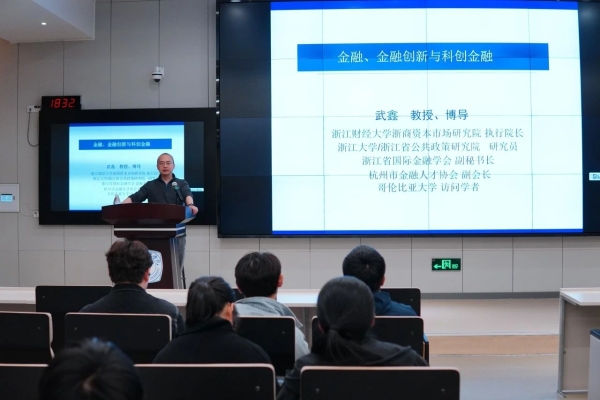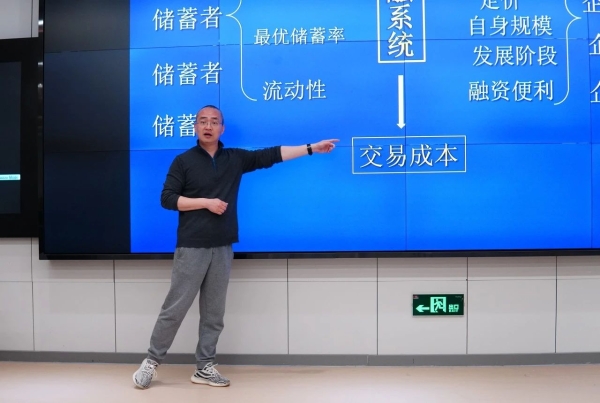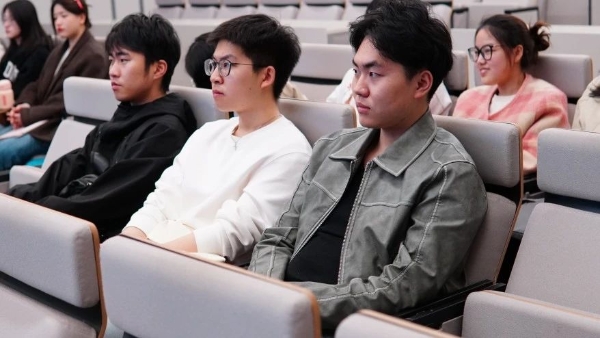|
Seminar Time:Financial Innovation and Technological Innovation
|
|||
|
|||
|
On the evening of March 28th, Professor Wu Xin was invited to the University of Waikato Joint Institute at Hangzhou City University (NZUWI) to give a lecture on financial innovation, and technological innovation to students majoring in finance. Quest Speaker's introduction: Wu Xin Professor of Finance at Zhejiang University of Finance and Economics, Distinguished Researcher at Public Policy Institute of Zhejiang Province, Vice Secretary General of The International Finance Association of Zhejiang Province, Vice President of Hangzhou Financial Talents Association, and Third-Level Trainer of The 151 Talent Project of Zhejiang Province. His research focuses on financial markets and financial innovation.
In this lecture, Professor Wu Xin introduced the related concepts of finance in plain language.
Professor Wu Xin took the simplified financial model as an example. He stated that in financial activities, there are Party A and Party B, respectively, with Party A engaged in consumption and investment, and Party B being a depositor. They cooperate with each other to achieve the key feature of cross period resource allocation in financial activities.
Professor Wu also explained that the most critical feature of finance is not the transaction between A and B, but the needs of finance over time, which means there must be consideration of the present and the future, and we should learn to re-adjust resources in the time dimension. This behavior is called intertemporal allocation of resources, and this phenomenon is the basis of finance. If it involves intertemporal criteria, then another feature of finance, called risk, is bound to emerge.
The financial model is actually very complex. For everyone to better understand the financial market, Professor Wu used a simple financing model in the financial market to explain. Depositors provide funds for entrepreneurs to achieve investment, value-added, and innovation goals. Wu gave students an example: if we buy a computer for entertainment, it belongs to consumption. If it is for learning, it is a special investment, which is called human capital investment. Professor Wu further explained that the most typical human resources investment is the students' education, that is, from learning to speak to becoming a college student.
In addition, entrepreneurs also play a significant role in the financial system. As the soul of the market economy, entrepreneurs promote economic development. They enable the economy to achieve a continuous combination of new elements, that is, a process of creative destruction that constantly innovates the economic structure from within. Professor Wu listed the entrepreneurs represented by Schumpeter and Jobs who have the function of realizing innovation and introducing new combinations. Wu raised two questions: Why should we trust entrepreneurs? How are the entrepreneurs controlled?
Wu Xin explained that if we want to prove that he/she is an excellent entrepreneur, we should review his/her history and verify it through data analysis and historical precipitation. The first question mentioned above can be quantified, while the second question needs government supervision, incentives, and legal improvement.
In addition, Professor Wu explained to students the characteristics of direct financing and indirect financing in the financial system, that is, the fund supplier and the fund demand side through financial intermediaries, such as commercial banks, investment banks, securities markets, fund transactions. The financial system acts as an intermediary between savers and entrepreneurs. What students majoring in finance should do in the future is to reduce transaction costs through financial knowledge, to make some contributions to society.
Through this lecture, students have gained a deeper understanding of the financial system and financial innovation. It is expected that the financial industry can continue to innovate and develop in the future, and students can learn more financial knowledge, improve their financial literacy, and make greater contributions to the future financial industry.
|
|||
 【Print】 【Print】
 【Close】 【Close】 | |||


